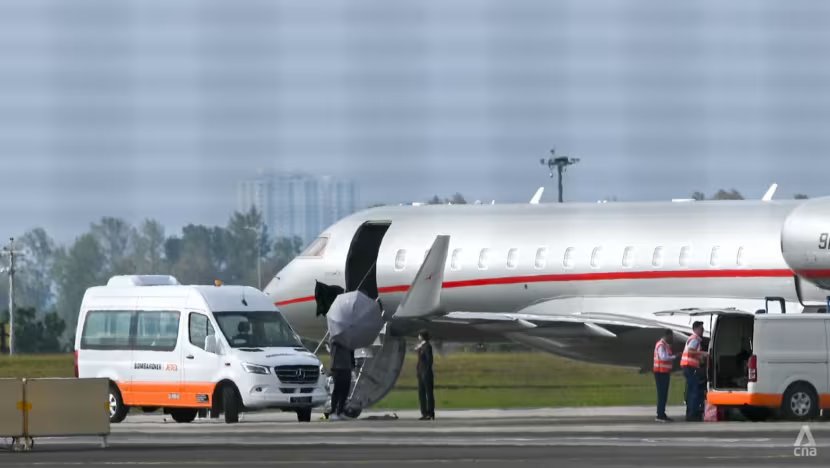The Singapore Tourism Board provided a grant to bring Taylor Swift’s world tour to Singapore next month, her only stop in Southeast Asia. (File photo: Reuters/Kim Kyung-Hoon)
The buzz around Singapore’s grant to bring in the Taylor Swift Eras Tour concerts has made salient just how important it is to find ways to stay competitive, says NUS Business School’s Samer Elhajjar.
SINGAPORE: Taylor Swift fans are gearing up for her six sold-out Eras Tour concerts in town. But some non-Swifties may instead be pondering: Is funding a billionaire’s shows truly an optimal use of their hard-earned money?
From our partners:
The recent revelation that the Singapore Tourism Board (STB) provided a grant to bring the megastar to Singapore has ignited debate about the prudent use of taxpayers’ money. While the exact amount and terms of the grant remain undisclosed, many have latched on to Thai Prime Minister Srettha Thavisin’s claim that US$2 million to US$3 million had been offered per show in exchange for exclusivity in Southeast Asia.
Naysayers may first need to revise their “Swiftonomics”. According to economists, Taylor Swift’s six-night performances are projected to boost Singapore’s economy by up to S$500 million (US$371 million) in tourism receipts.
The National Australia Bank estimated that her run of seven concerts pumped A$558 million (US$363 million) into the economy. Japan – Taylor Swift’s only other Asian stop in her world tour – estimated an economic impact of over ¥34 billion (US$226 million) from her four nights in Tokyo.
RIPPLE EFFECT OF “SWIFTONOMICS”
For a small country like Singapore, hosting high-profile events is a strategic move.
It attracts overseas visitors – intensified by the fact that this is her only stop in Southeast Asia – who contribute to the economy by spending on accommodation, dining, transport and entertainment. Hotels and airlines have reported a 30 per cent increase in demand for flights and accommodation, around the dates of Taylor Swift’s concerts.
And that’s just the expected boost in hospitality and retail. A surge in tourism also creates employment opportunities in other sectors, such as event management. From exhibitions, pop-ups and sing-along events, there are flexible job options in event coordination, logistics, catering, security and customer service.
This economic ripple effect extends even to small-scale vendors, who can leverage digital platforms like TikTok to showcase their merchandise to a wider audience during such events. Entrepreneurial individuals often sell custom T-shirts, posters, accessories or memorabilia related to the featured artist.
Hosting Taylor Swift draws on her massive appeal to boost Singapore’s global visibility, reinforcing its reputation as an entertainment hub and showcasing its ability to host world-class acts.
A BALANCING ACT
On the flip side, funding such high-profile entertainment events is not without risks.
For one, there is public perception. Some may argue that finite public resources should be prioritised for pressing issues like healthcare, education or social welfare. Transparency and accountability become paramount.
Another critical risk factor is the cost-benefit analysis. The exorbitant cost associated with attracting big-name artists raises questions about the return on investment (ROI).
A purported S$12 million to S$18 million incentive with an estimated return of S$500 million seems a sound investment, if taxpayers can see it trickle down back to them and how it compares to other economic development strategies.
Hence, it is imperative to evaluate whether the expenditure on such events aligns with Singapore’s broader economic goals and whether alternative investments might yield higher returns.
The value of the grant could also set an uneasy precedent for future funding requests, potentially straining budget allocations for other initiatives. Singapore may face competition from other cities or countries offering similar grants or incentives to attract high-profile events, leading to bidding wars and escalating costs without guaranteed returns.

While high-profile events generate immediate attention and revenue, their lasting impact on economic development may be limited. Over-emphasis on MICE (Meetings, Incentives, Conventions and Exhibitions) events for economic growth may overshadow more strategic and sustainable long-term initiatives and pose risks in the face of changing market dynamics and external factors.
Hence, navigating these risks requires a delicate balance between fostering growth and ensuring social equity as well as responsible governance.
SALIENT EXAMPLE OF STAYING COMPETITIVE
Singapore must undoubtedly distinguish itself from its competitors. Countries feeling left out of the Eras Tour, like Thailand and Indonesia, have already said they will do more to attract world-class acts and leverage Swiftonomics to their advantage.
In tourism, it is important to recognise that Singapore’s status as a stop-over rather than a stay-over destination requires innovative strategies.
Beyond events that are exceptions that prove the rule, the industry will likely benefit more from collaboration. Singapore must offer compelling experiences domestically (across segments including hospitality, food, leisure, outdoor and indoor wellness activities, cruise holidays and heritage experiences) but also foster regional partnerships for cross-border tourism to enhance appeal and broaden its reach.
And therein lies a larger important lesson: Taylor Swift has made salient just how important it is for Singapore to find ways to stay competitive, beyond the tourism or MICE sectors. Singapore had the element of surprise with the Eras Tour, but it may not be sufficient for the next star act or business it wants to attract.
Samer Elhajjar is Senior Lecturer from the Department of Marketing, National University of Singapore Business School. The opinions expressed are those of the writer and do not represent the views and opinions of NUS.
Source: CNA/ch
By: Samer Elhajjar
Originally published at: CNA Lifestyle
For enquiries, product placements, sponsorships, and collaborations, connect with us at hello@zedista.com. We'd love to hear from you!
Our humans need coffee too! Your support is highly appreciated, thank you!

